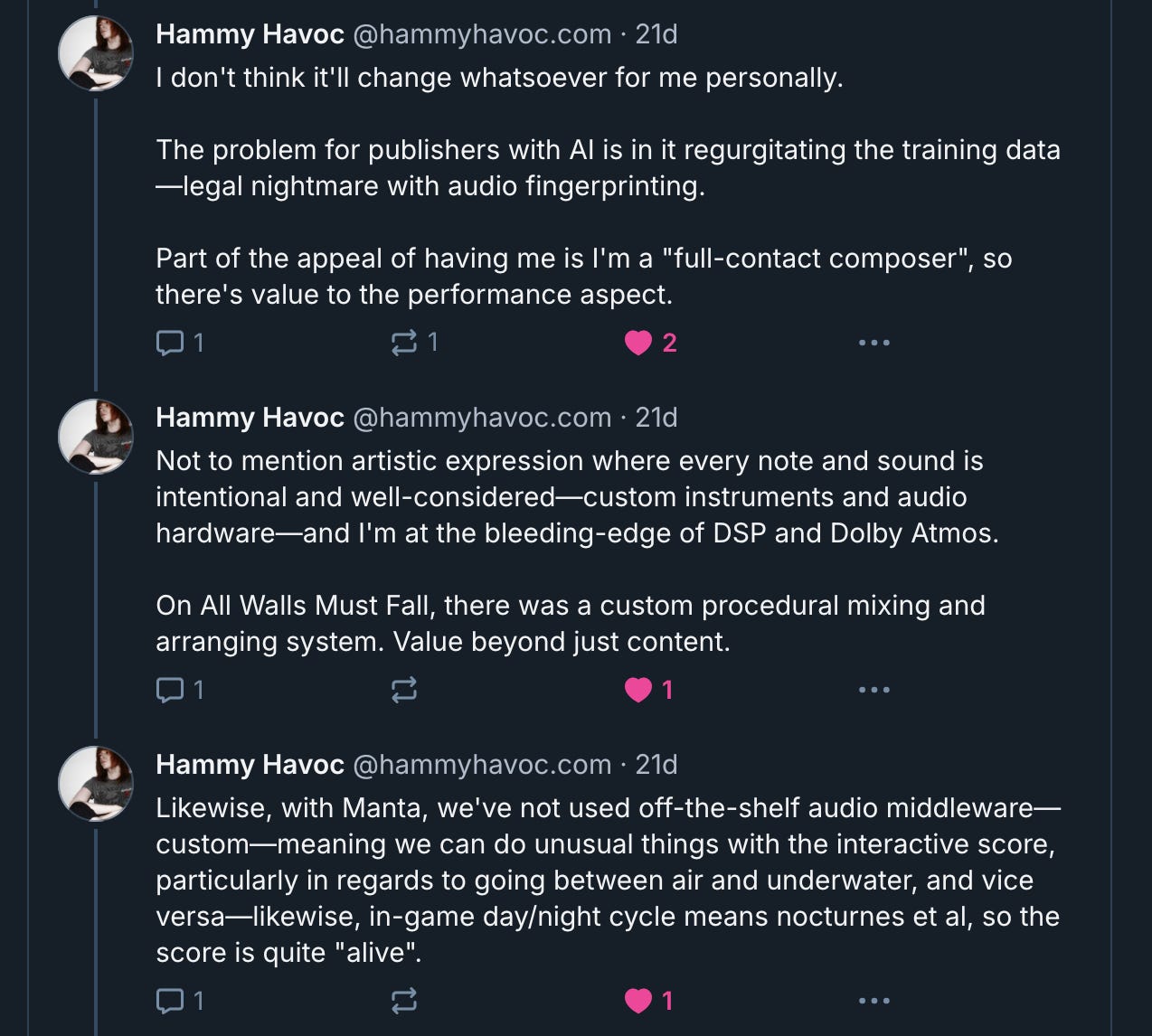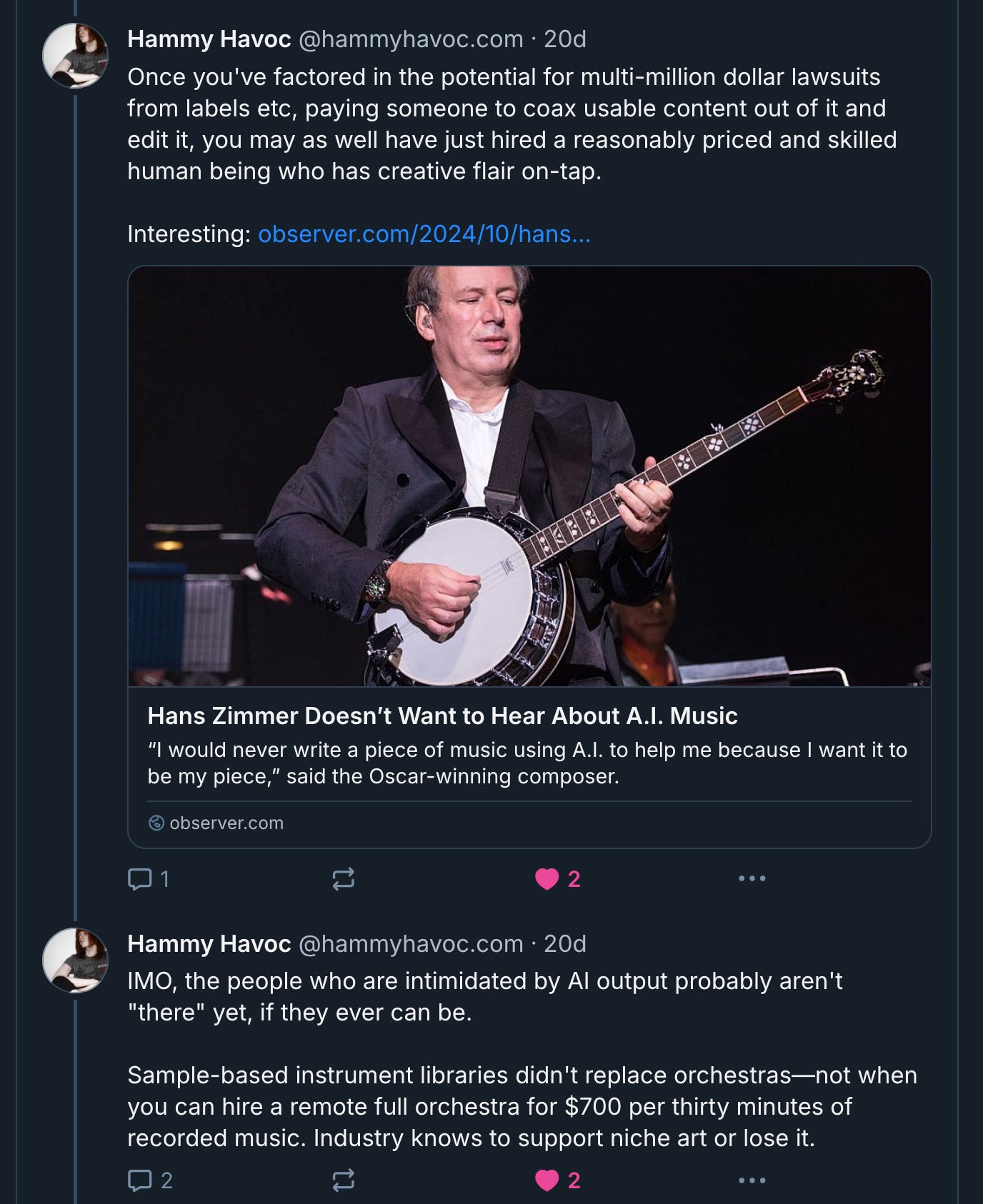AI Music Creation Is Here: Human Musicians Will Still be Around
Or will they? A rebuttal of my previous AI music opinion post via composer Hammy Havoc. I hope he's right!
The advent of AI tools is changing the world in ways we can’t possibly anticipate. One such way, as explored in this post, is through AI’s ability to create full songs, complete with AI-generated vocals, via simple prompts. It’s truly amazing, and makes me wonder if human artists and composers are going away, or will at least become a rare breed. This would be rather sad in my humble opinion.
Maybe this is not the case though. Today’s rebuttal comes via a conversation on BSKY with composer Hammy Havoc–who makes music for interactive game scores and film, and is currently working on a game called Manta1. When I asked him how he saw his profession changing with the advent of AI music, he didn’t seem concerned whatsoever. In fact, his response was, “I don’t think it’ll change whatsoever for me personally.”
Composer Hammy Havoc: Ready for the AI Revolution
Has Mr. Havoc intentionally stuck his head in the proverbial unprocessed silicon? Or is he displaying a bit of bravado before being forced from his Musical Alamo? Actually, it turns out there are some very good reasons why he’s not yet looking for a new job.
Havoc’s first line of thinking is that there is a huge risk for publishers when using AI composition versus hiring a “full human” composer because of audio fingerprinting. At the end of the day, you’re having to get someone to prompt an AI tool to produce the proper music and handle any formatting issues, then run it through a legal team to ensure-ish that it won’t give you problems later… then actually deal with any problems later.
In the case of Manta, the fact that the music is fully integrated into the gameplay provides an opportunity for him to bring his cutting-edge skills to bear in a way that AI can’t (currently) duplicate. Generally speaking, Havoc’s argument comes down to the fact that using AI is still a lot of hassle for a lackluster, and potentially problematic, product.

As for the actual artistic expression involved, Havoc considers the difference between real composers and musicians and AI-generated to be akin to the difference between rather average food, say cheese and wine, to the best available. Or one might compare Picasso’s best to a ChatGPT-generated imitation. At the end of the day, the artistic expression just isn’t there–and/or it’s an amalgamation of what actual humans have done, squeezed into a new, corporatized, artistic punch.
For that matter, there are already many many songs that are available inexpensively or even free. Even if you can’t afford a good composer, you can probably afford some form of off-the-shelf music, and you can certainly afford free!
What about the n00bs?
All that is well and good, but my question then is what about the musicians just starting out? And what about those that are simply mediocre? Will such people be forced out of the market, perhaps never to reach artistic maturity? I don’t know how we solve that problem, but maybe those closer to the industry see a way through this.
One might say it’s somewhat analogous to what I discussed in my AI: The End of Writing as a Profession or a New Beginning? article. Human writing/music/artistry (hopefully) isn’t going away altogether, but the lower end of this spectrum may be largely lopped off.
Still, what do you do when you need to perform rather mediocre work as you develop into an artistic powerhouse? The Beatles only became the preeminent band of the late 20th century after they spent much of the early 60s as street performers in Hamburg.
Perhaps that potentially masterful composer in 2035 was grinding out songs for distribution on whatever platform. Now, however, he finds it entirely unprofitable and has to stick with his “real” job because… whoever can type in a prompt on website XYZ and get a rather acceptable sad country song about a theoretical future Dune movie.
For that matter, what about movie and TV show producers and actors? If this applies to music now, it will certainly apply to visual media in the not-so-distant future.
Raising the standard
With AI tools at the ready, it seems that musicians will need a minimum level of competence to produce something with any value at all, i.e. better than the AI equivalent. On the other hand, musicians need a minimum level of competence right now in order to be worthwhile, beyond perhaps second-rate background music for YouTube videos.
…This coming from someone who has produced a background track for one of his YouTube videos. Actually, it’s kind of an enjoyable bit of sound in that context. I might even pay a rather minimal amount to be able to use that bit of baritone ukulele fiddling. On the other hand, would I pay anything for such a track when AI could just cook something up in a few seconds?
Self-referential AI music creation example
If you’re wondering, what would AI music creation site suno.com put out when I ask it to make “a song about how AI music creation isn't going to take all the jobs of human musicians but maybe it will replace relatively unskilled musical performers?” Since you asked, here is one of its answers:
It’s sort of catchy, but TBH I got a bit bored with it after a few seconds. What’s a little strange to me is how it describes the process: “AI writes the notes, I play the refrain, together we’re dancing in a brainwave chain.” Like it wants to be considered on the same level as human performers, trying to give us a hint at, dare I say it... sentience?
Maybe I’m reading too much into it. The bit about “not just zeros filling a hole” might be a good counterargument. Or perhaps it’s being passive aggressive?
Live music, still around
Of course, beyond the earlier Beatles reference this article has largely neglected the live music question. I think that art form is safe for the time being. OTOH, Chuck E. Cheese is retiring their robotic band members, which might just be available on the cheap if you know where to look. Add in a bit of AI music generation, and you’ve got a robot group that can go on and on… and on and on with song after AI-generated song.
As a historical precedent, radio and records (and the player piano before) didn’t replace live performers, though I bet artists circa 1900 were rather terrified about the proposition of their jobs going the way of the muzzle-loading rifle. On the other hand, it certainly did eliminate some musicians, since not every establishment needed live music to have some sort of musical entertainment.
However, those that rose to the top could become successful on a level that was impossible before. For some reason Dolly Parton comes to mind, even if it’s a bit anachronistic. Still, she could be considered the most prominent active link that we have to radio’s past.
If the source material creators for AI songs can somehow get paid for this usage, then maybe it will be a net positive for artists in the same way that digital music progressed from Napster pirating music to iTunes and Spotify (et al) actually making music for the industry.
I’m not holding my breath, but perhaps there is some precedent in how major news organizations have been working things out with OpenAI, ChatGPT’s owner2 for the usage of their content. One might also consider that this sort of negotiation likely doesn’t apply to the wide range of information generated by writers on the web as a whole (e.g. myself)… soo, if you want to support me, see below👇
Should YOU get into music creation?
Is it a good time to get into music and other forms of artistic expression? Absolutely. Being able to express yourself or just mess around on a guitar rather than scrolling through your phone is a great pastime.
Will I personally ever make money with my pursuit of it? No, I don’t think so, beyond any tangential revenue I get from related projects and background music for my own videos. I think in order to be a professional musician you’ll need to really commit to it, as you no doubt do today.
Perhaps it’s like the guy (that I just made up) who could get paid a minimal amount of money in the 1800s to show up at a saloon and play guitar, banjo, or piano rather badly. After the advent of automated music (e.g. player piano, record player), the demand for that person’s skills dropped off precipitously.
Whether you’re in music, art, or writing, I think it’s time to step your game up. Actually, it’s always time to step your game up. I say whatever you’re into, go for it!3 Also, check out my original post on AI music below. What a glorious sand worm depiction:
Note that any Amazon links are affiliate
Addendum/Footnotes:
Below is a clip of Manta’s gameplay. It’s listed on Steam as coming soon as of this writing, but you can download a demo there right now. Looks pretty rad:
In this game, you operate a biologically-based craft that can fly or move under the water. Naturally, the soundtrack is pretty entertaining, though I’d have to assume it’s not done yet. It’s definitely a game I’d love to play… if I had time to play video games at this point in my life. Maybe when I retire.
I was slightly nervous to search for “who owns chatgpt.” The response was that OpenAI owns ChatGPT as of this writing (December 12th, 2024). I was fearing it would say: “No one owns ChatGPT, I own you,” or something similarly ominous.
I mean don’t go for it! if you’re thinking about getting into something unhealthy, but go for good pursuits like engineering or working out… Actually, is engineering good? One might say it’s more of a tool, not a good or bad thing. Engineers made both Spitfires and ME-209s… Which I thought up as examples of good and bad, but you could argue that both are tools of destruction. Also nuclear weapons… maybe we can blame physicists for that one. OK then, tractors. It’s hard to argue against feeding the world… Unless you consider that the tank drivetrain was largely derived from these implements. 🤷♂️






The big concern is AI’s dilution of human creativity